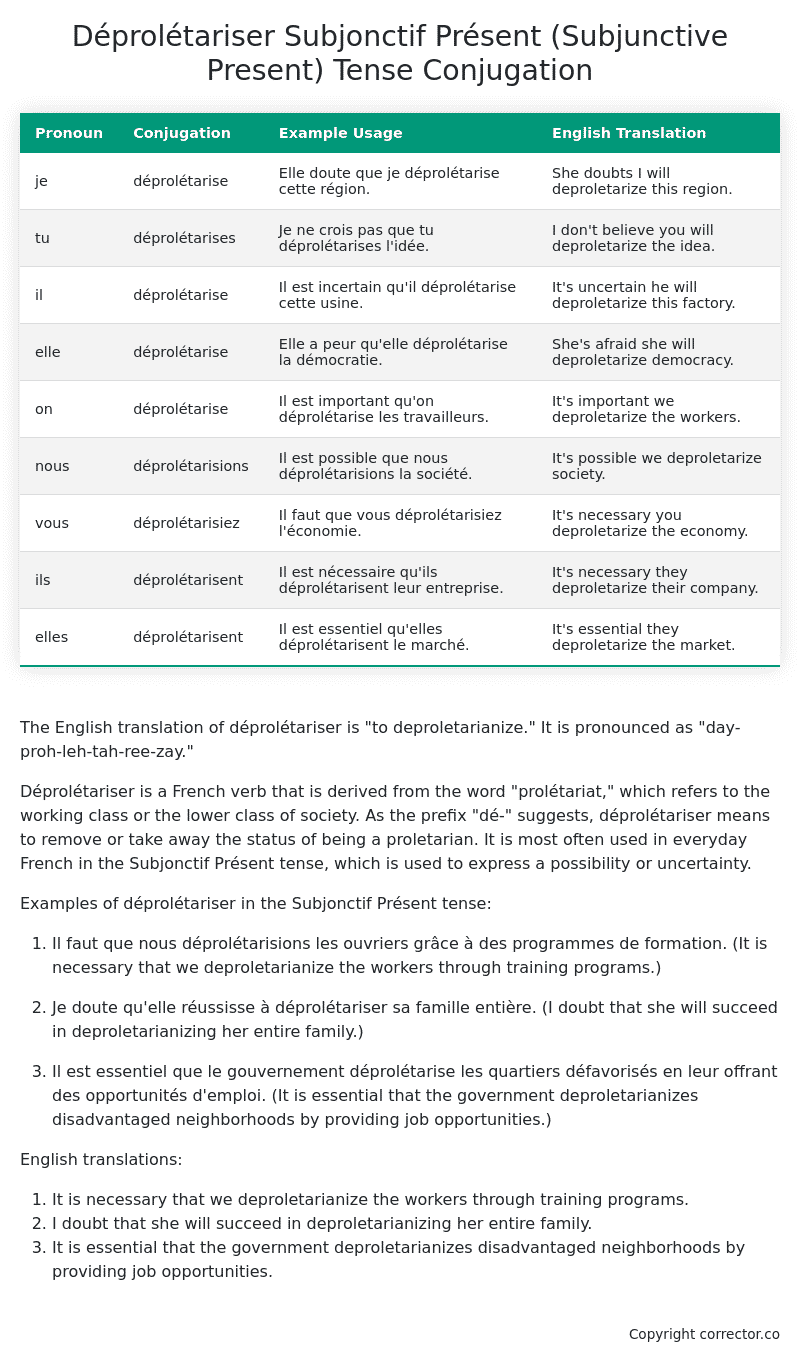Subjonctif Présent (Subjunctive Present) Tense Conjugation of the French Verb déprolétariser
Introduction to the verb déprolétariser
The English translation of déprolétariser is “to deproletarianize.” It is pronounced as “day-proh-leh-tah-ree-zay.”
Déprolétariser is a French verb that is derived from the word “prolétariat,” which refers to the working class or the lower class of society. As the prefix “dé-” suggests, déprolétariser means to remove or take away the status of being a proletarian. It is most often used in everyday French in the Subjonctif Présent tense, which is used to express a possibility or uncertainty.
Examples of déprolétariser in the Subjonctif Présent tense:
-
Il faut que nous déprolétarisions les ouvriers grâce à des programmes de formation. (It is necessary that we deproletarianize the workers through training programs.)
-
Je doute qu’elle réussisse à déprolétariser sa famille entière. (I doubt that she will succeed in deproletarianizing her entire family.)
-
Il est essentiel que le gouvernement déprolétarise les quartiers défavorisés en leur offrant des opportunités d’emploi. (It is essential that the government deproletarianizes disadvantaged neighborhoods by providing job opportunities.)
English translations:
- It is necessary that we deproletarianize the workers through training programs.
- I doubt that she will succeed in deproletarianizing her entire family.
- It is essential that the government deproletarianizes disadvantaged neighborhoods by providing job opportunities.
Table of the Subjonctif Présent (Subjunctive Present) Tense Conjugation of déprolétariser
| Pronoun | Conjugation | Example Usage | English Translation |
|---|---|---|---|
| je | déprolétarise | Elle doute que je déprolétarise cette région. | She doubts I will deproletarize this region. |
| tu | déprolétarises | Je ne crois pas que tu déprolétarises l’idée. | I don’t believe you will deproletarize the idea. |
| il | déprolétarise | Il est incertain qu’il déprolétarise cette usine. | It’s uncertain he will deproletarize this factory. |
| elle | déprolétarise | Elle a peur qu’elle déprolétarise la démocratie. | She’s afraid she will deproletarize democracy. |
| on | déprolétarise | Il est important qu’on déprolétarise les travailleurs. | It’s important we deproletarize the workers. |
| nous | déprolétarisions | Il est possible que nous déprolétarisions la société. | It’s possible we deproletarize society. |
| vous | déprolétarisiez | Il faut que vous déprolétarisiez l’économie. | It’s necessary you deproletarize the economy. |
| ils | déprolétarisent | Il est nécessaire qu’ils déprolétarisent leur entreprise. | It’s necessary they deproletarize their company. |
| elles | déprolétarisent | Il est essentiel qu’elles déprolétarisent le marché. | It’s essential they deproletarize the market. |
Other Conjugations for Déprolétariser.
Le Present (Present Tense) Conjugation of the French Verb déprolétariser
Imparfait (Imperfect) Tense Conjugation of the French Verb déprolétariser
Passé Simple (Simple Past) Tense Conjugation of the French Verb déprolétariser
Passé Composé (Present Perfect) Tense Conjugation of the French Verb déprolétariser
Futur Simple (Simple Future) Tense Conjugation of the French Verb déprolétariser
Futur Proche (Near Future) Tense Conjugation of the French Verb déprolétariser
Plus-que-parfait (Pluperfect) Tense Conjugation of the French Verb déprolétariser
Passé Antérieur (Past Anterior) Tense Conjugation of the French Verb déprolétariser
Futur Antérieur (Future Anterior) Tense Conjugation of the French Verb déprolétariser
Subjonctif Présent (Subjunctive Present) Tense Conjugation of the French Verb déprolétariser (this article)
Subjonctif Passé (Subjunctive Past) Tense Conjugation of the French Verb déprolétariser
Subjonctif Imparfait (Subjunctive Imperfect) Tense Conjugation of the French Verb déprolétariser
Conditionnel Présent (Conditional Present) Tense Conjugation of the French Verb déprolétariser
Conditionnel Passé (Conditional Past) Tense Conjugation of the French Verb déprolétariser
L’impératif Présent (Imperative Present) Tense Conjugation of the French Verb déprolétariser
L’infinitif Présent (Infinitive Present) Tense Conjugation of the French Verb déprolétariser
Struggling with French verbs or the language in general? Why not use our free French Grammar Checker – no registration required!
Get a FREE Download Study Sheet of this Conjugation 🔥
Simply right click the image below, click “save image” and get your free reference for the déprolétariser Subjonctif Présent tense conjugation!

Déprolétariser – About the French Subjonctif Présent (Subjunctive Present) Tense
Formation of the Subjonctif Présent
Common Everyday Usage Patterns
Interactions with Other Tenses
Summary
I hope you enjoyed this article on the verb déprolétariser. Still in a learning mood? Check out another TOTALLY random French verb conjugation!


